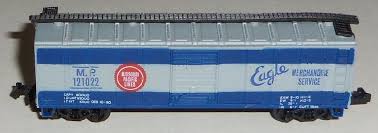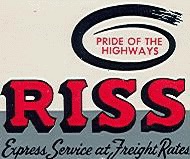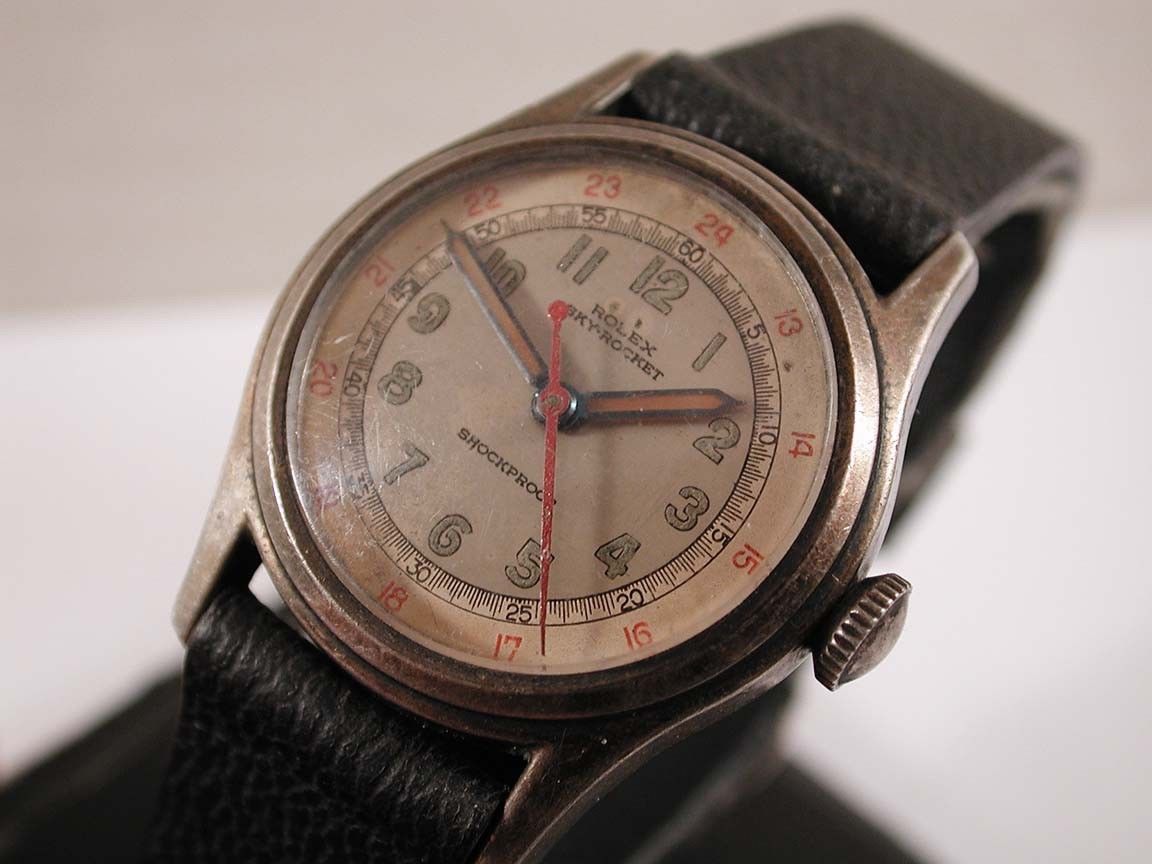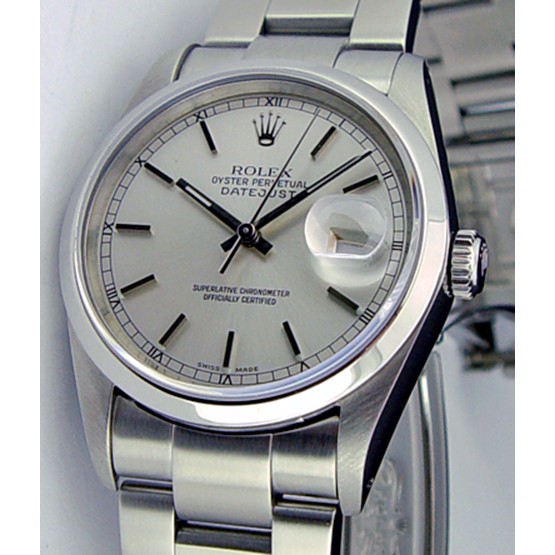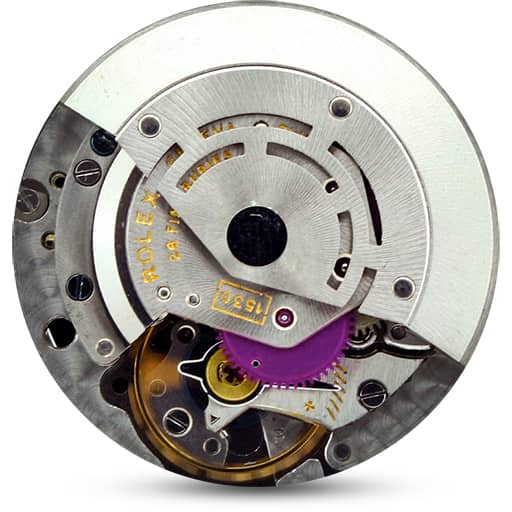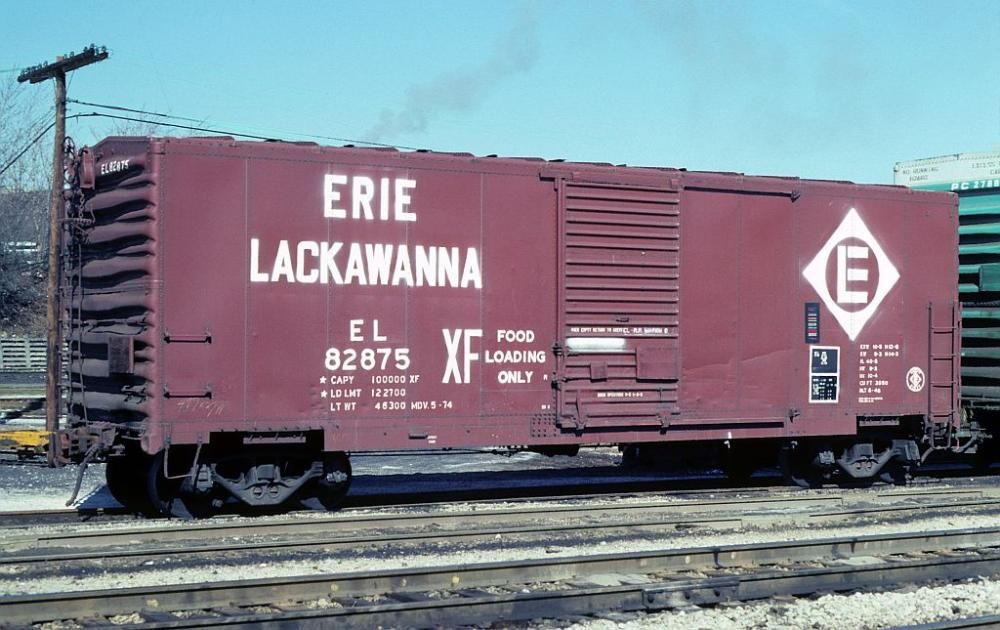Life-Like - 7757 - Boxcar, 40 Foot, Steel Single Door - Missouri Pacific - 121022
Click to see the details
market
Click to see the details
history
Click to see the details
collector
| Stock Number | 7757 |
| Brand | Life-Like |
| Manufacturer | Mehano |
| Body Style | Mehano Boxcar 40 Foot Steel |
| Prototype Vehicle | Boxcar, 40 Foot, Steel Single Door (Details) |
| Road or Company Name | Missouri Pacific (Details) |
| Reporting Marks | MP |
| Road or Reporting Number | 121022 |
| Paint Color(s) | Blue and Silver |
| Print Color(s) | Blue and White |
| Additional Markings/Slogan | Eagle Merchandise Service |
| Coupler Type | Rapido Hook |
| Wheel Type | Nickel-Silver Plated Metal |
| Wheel Profile | Deep Flange |
| Item Category | Rolling Stock (Freight) |
| Model Type | Boxcar |
| Model Subtype | 40 Foot |
| Model Variety | Steel |
| Prototype Region | North America |
| Prototype Era | NA Era III: Transition (1939 - 1957) |
| Scale | 1/160 |
Model Information:
Mehano first produced this car for MRC. It is a direct knock-off of the Rivarossi-made steel boxcar, inspired from the PRR X-29 prototype. It purportedly designed by Atlas to replace the Rivarossi model (labor costs in Italy?), but Atlas never actually ordered any to be made once the design was completed by Mehano. I am not confident this is true as the oldest versions of this car that I have seen are stamped 'MRC Yugoslavia' which implies the mold was designed for MRC and not Atlas. It was later imported by Life-Like, Model Power and AHM. It carries nickel-silver plated wheels and Rapido couplers. It is a typical 1st gen rolling stock model with low-quality pad printing (at least for the older models) and a simple mold.
Model Power later re-ran their Mehano-made models in China, using the same roadnames and numbers and the same stock number. The main differences between the Mehano and the Chinese molds can be observed on the door and the sill of the underframe; the Mehano is also slightly lower in height. The best way to distinguish them remains however the marking on the under-frame (Yugoslavia or Hong-Kong)
Model Power later re-ran their Mehano-made models in China, using the same roadnames and numbers and the same stock number. The main differences between the Mehano and the Chinese molds can be observed on the door and the sill of the underframe; the Mehano is also slightly lower in height. The best way to distinguish them remains however the marking on the under-frame (Yugoslavia or Hong-Kong)
Prototype History:
Steel boxcars became a common site in the post-WWII period (also known as the transition era). Steel construction resulted in a lighter, lower-maintenance car that was less expensive to acquire and operate. The economies of scale that happened during the war along with a cessation of orders from the military resulted in a plentiful, inexpensive source of metal and aluminum for the railcar manufacturers which in turn led a complete replacement of the aging wood-sheathed fleets with new steel cars.
Road Name History:
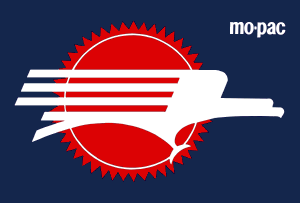 The Missouri Pacific Railroad (reporting mark MP), commonly abbreviated MoPac, with nickname of The Mop, was one of the first railroads in the United States west of the Mississippi River. MoPac was a Class I railroad growing from dozens of predecessors and mergers, including the St. Louis, Iron Mountain and Southern Railway (SLIMS), Texas and Pacific Railway (TP), Chicago and Eastern Illinois Railroad (C&EI), St. Louis, Brownsville and Mexico Railway (SLBM), Kansas, Oklahoma and Gulf Railway (KO&G), Midland Valley Railroad (MV), San Antonio, Uvalde and Gulf Railroad (SAU&G), Gulf Coast Lines (GC), International-Great Northern Railroad (IGN), New Orleans, Texas and Mexico Railway (NOTM), Missouri-Illinois Railroad (MI), as well as the small Central Branch Railway (an early predecessor of MP in Kansas and south central Nebraska), and joint ventures such as the Alton and Southern Railroad (AS).
The Missouri Pacific Railroad (reporting mark MP), commonly abbreviated MoPac, with nickname of The Mop, was one of the first railroads in the United States west of the Mississippi River. MoPac was a Class I railroad growing from dozens of predecessors and mergers, including the St. Louis, Iron Mountain and Southern Railway (SLIMS), Texas and Pacific Railway (TP), Chicago and Eastern Illinois Railroad (C&EI), St. Louis, Brownsville and Mexico Railway (SLBM), Kansas, Oklahoma and Gulf Railway (KO&G), Midland Valley Railroad (MV), San Antonio, Uvalde and Gulf Railroad (SAU&G), Gulf Coast Lines (GC), International-Great Northern Railroad (IGN), New Orleans, Texas and Mexico Railway (NOTM), Missouri-Illinois Railroad (MI), as well as the small Central Branch Railway (an early predecessor of MP in Kansas and south central Nebraska), and joint ventures such as the Alton and Southern Railroad (AS).
In 1967, the railroad operated 9,041 miles of road and 13,318 miles of track, not including DK&S, NO&LC, T&P and its subsidiaries, C&EI and Missouri-Illinois.
On January 8, 1980, the Union Pacific Railroad agreed to buy the Missouri Pacific Railroad. Lawsuits filed by competing railroads delayed approval of the merger until September 13, 1982. After the Supreme Court denied a trial to the Southern Pacific, the merger took effect on December 22, 1982. However, due to outstanding bonds of the Missouri Pacific, the merger with Union Pacific become official only on January 1, 1997.
Read more on Wikipedia.

In 1967, the railroad operated 9,041 miles of road and 13,318 miles of track, not including DK&S, NO&LC, T&P and its subsidiaries, C&EI and Missouri-Illinois.
On January 8, 1980, the Union Pacific Railroad agreed to buy the Missouri Pacific Railroad. Lawsuits filed by competing railroads delayed approval of the merger until September 13, 1982. After the Supreme Court denied a trial to the Southern Pacific, the merger took effect on December 22, 1982. However, due to outstanding bonds of the Missouri Pacific, the merger with Union Pacific become official only on January 1, 1997.
Read more on Wikipedia.
Brand/Importer Information:
 Life-Like Products LLC (now Life-Like Toy and Hobby division of Wm. K. Walthers) was a manufacturer of model railroad products and was based in Baltimore, Maryland.
Life-Like Products LLC (now Life-Like Toy and Hobby division of Wm. K. Walthers) was a manufacturer of model railroad products and was based in Baltimore, Maryland.
It was founded in the 1950s by a company that pioneered extruded foam ice chests under the Lifoam trademark. Because ice chests are a summer seasonal item, the company needed a way to keep the factory operating year round. As model railroading was becoming popular in the post-war years, they saw this as an opportunity and so manufactured extruded foam tunnels for model trains. Over the years, Life-Like expanded into other scenery items, finally manufacturing rolling stock beginning in the late 1960s. At some point in the early 1970s, Life-Like purchased Varney Inc. and began to produce the former Varney line as its own.
The Canadian distributor for Life-Like products, Canadian Hobbycraft, saw a missing segment in market for Canadian model prototypes, and started producing a few Canadian models that were later, with a few modifications, offered in the US market with US roadnames.
In 2005, the company, now known as Lifoam Industries, LLC, decided to concentrate on their core products of extruded foam and sold their model railroad operations to Wm. K. Walthers.
In June 2018, Atlas and Walthers announced to have reached an agreement under which all Walthers N scale rolling stock tooling, including the former Life-Like tooling, will be purchased by Atlas.
Read more on Wikipedia and The Train Collectors Association.

It was founded in the 1950s by a company that pioneered extruded foam ice chests under the Lifoam trademark. Because ice chests are a summer seasonal item, the company needed a way to keep the factory operating year round. As model railroading was becoming popular in the post-war years, they saw this as an opportunity and so manufactured extruded foam tunnels for model trains. Over the years, Life-Like expanded into other scenery items, finally manufacturing rolling stock beginning in the late 1960s. At some point in the early 1970s, Life-Like purchased Varney Inc. and began to produce the former Varney line as its own.
The Canadian distributor for Life-Like products, Canadian Hobbycraft, saw a missing segment in market for Canadian model prototypes, and started producing a few Canadian models that were later, with a few modifications, offered in the US market with US roadnames.
In 2005, the company, now known as Lifoam Industries, LLC, decided to concentrate on their core products of extruded foam and sold their model railroad operations to Wm. K. Walthers.
In June 2018, Atlas and Walthers announced to have reached an agreement under which all Walthers N scale rolling stock tooling, including the former Life-Like tooling, will be purchased by Atlas.
Read more on Wikipedia and The Train Collectors Association.
Manufacturer Information:
Mehano is a Slovenian toy manufacturer located in Izola, Slovenija. The company was founded as Mehanotehnika and was producing toys starting in June 1953. They first exhibited at the Nuerenberg Toy Fair in 1959. Mehano produced a number of different locomotives and rolling stock models for the North American market in the 1960s and 1970s. Companies such as Atlas and Life-Like imported a huge variety of their products. Generally they can easily be recognized as they are stamped "Yugosolavia" on the underframe. The company was formally renamed "Mehano" in 1990. Izola today is part of the country of Slovenia since the breakup of Yugoslavia.
Mehano filed for bankruptcy in 2008, but still continued to exist and operate. Since 2012, Mehano products are distributed by Lemke.
Mehano filed for bankruptcy in 2008, but still continued to exist and operate. Since 2012, Mehano products are distributed by Lemke.
Item created by: Alain LM
on 2017-10-05 16:47:57
Last edited by: gdm on 2022-11-01 11:05:39
If you see errors or missing data in this entry, please feel free to log in and edit it. Anyone with a Gmail account can log in instantly.
Last edited by: gdm on 2022-11-01 11:05:39
If you see errors or missing data in this entry, please feel free to log in and edit it. Anyone with a Gmail account can log in instantly.


